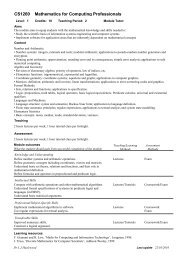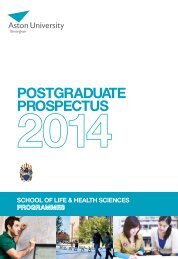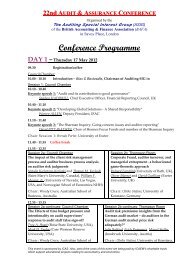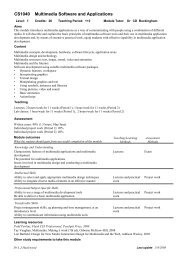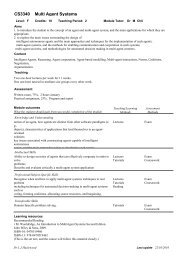Postgraduate ProsPectus - Aston University
Postgraduate ProsPectus - Aston University
Postgraduate ProsPectus - Aston University
You also want an ePaper? Increase the reach of your titles
YUMPU automatically turns print PDFs into web optimized ePapers that Google loves.
School of Engineering & Applied Science<br />
Engineering Education Research Group<br />
School of Engineering & Applied Science<br />
European Bioenergy Research Institute<br />
Group overview<br />
Ensuring the highest quality and most relevant<br />
engineering education for students is a goal of every<br />
university engineering department. The Engineering<br />
Education Research Group is focused on developing<br />
the understanding that will enable colleagues across<br />
the sector to introduce innovative and relevant learning<br />
and teaching practice that addresses the needs of<br />
industry whilst engaging students in their learning.<br />
Research interests<br />
The group, which is made up of both engineering and<br />
social science academics, is not only concerned with<br />
HE, but the whole ‘engineering education pipeline’ from<br />
primary school to the employment of engineers and<br />
their continued learning.<br />
Application and contact<br />
Research Group Convenor<br />
Dr. Robin Clark<br />
T: +44 (0)121 204 3567<br />
F: +44 (0)121 204 3676<br />
E: r.p.clark@aston.ac.uk<br />
W: www.aston.ac.uk/eas/research/groups/eerg<br />
Current projects<br />
Evaluation of active learning<br />
The importance of relationships, variety and<br />
coherency in engineering education<br />
Bringing business and engineering together<br />
Attributes of the graduate engineers of the future<br />
Introducing engineering at primary school level<br />
Peer mentoring and strategies to aid transition into<br />
university.<br />
Specialist equipment<br />
State-of-the-art facilities such as confocal<br />
microscopes, microlaser tracking systems, atomic<br />
force microscope, scanning micro laser vibrometer,<br />
EMG monitoring equipment, robotic manipulators and<br />
rapid prototyping facilities.<br />
Funding sources<br />
National HE STEM Programme, Royal Academy of<br />
Engineering, HEFCE/Paul Hamlyn Foundation, EU,<br />
Higher Education Academy.<br />
Collaboration<br />
The group collaborates extensively with universities<br />
and organisations in the UK, Europe and beyond,<br />
particularly through the national and international<br />
Engineering Education Research networks associated<br />
with the HEA, SEFI, A2E2, ASEE and REEN.<br />
Group overview<br />
Launched in 2007, the European Bioenergy<br />
Research Institute (EBRI) at <strong>Aston</strong> <strong>University</strong> has<br />
created a unique platform for the development<br />
and implementation of bioenergy systems in local,<br />
national, European and international contexts.<br />
Research interests<br />
EBRI performs research and knowledge transfer in<br />
all aspects of bioenergy, by acting as a demonstrator<br />
of these technologies and by providing industrial<br />
research collaborators the opportunity to run process<br />
trials, evaluate feed materials and study combinations<br />
of processes prior to investment. Research at<br />
EBRI focuses on topics such as thermo-chemical<br />
conversion techniques (lsuch as pyrolysis, gasification,<br />
combustion) of biomass, optimisation of reaction<br />
parameters by the study of formal kinetic parameters<br />
and hot gas filtration. EBRI also investigates special<br />
kinds of feedstock like algae by cultivating them in<br />
photo bio-reactors. The application of biochar on<br />
agricultural land is also being investigated.<br />
Specialist equipment<br />
Research equipment includes giant photo bioreactors<br />
harnessing algae, thermal reactors, bench and<br />
laboratory scale pyrolysers, gasifiers, combustors,<br />
catalytic refiners for biorefinery and synthesis of fuels,<br />
and fluidised bed reformers.<br />
Funding sources<br />
Funding sources are from the European Union as well<br />
as UK research funding councils. EBRI also hasmany<br />
projects with industry and academia from all over<br />
Europe. These partnerships are on a project basis,<br />
consulting basis or based on studentships.<br />
Collaboration<br />
EBRI is collaborating with partners both from industry<br />
and the academic community. Industrial partners<br />
include Severn Trent Water, Utilicom, E.ON, Schnell<br />
Motors, Moser Engines, Varicon Aqua Solutions,<br />
Oxford Catalysts, Johnson Matthey, Tenmat, WGD<br />
and WSE.<br />
EBRI is also working with local governing bodies<br />
including Birmingham City Council.<br />
EBRI was recently awarded £8.2 million from the<br />
European Regional Development Fund to build a new<br />
world-class facility on the <strong>Aston</strong> <strong>University</strong> campus<br />
to support businesses explore the high growth field<br />
of bioenergy. The new EBRI building opened in 2013.<br />
Facilities include six bioenergy topic laboratories<br />
exploring new biomass, micro-reactors, catalysis,<br />
syngas, pyrolysis and analytics.<br />
Application and contact<br />
Director of the European Bioenergy Research Institute<br />
Professor Andreas Hornung<br />
T: +44 (0)121 204 3391<br />
E: a.hornung@aston.ac.uk<br />
W: www.aston.ac.uk/ebri<br />
56 To find out more: Telephone: +44 (0)121 204 3400 | Email: engineering@aston.ac.uk | www.aston.ac.uk/eas<br />
www.aston.ac.uk<br />
57



